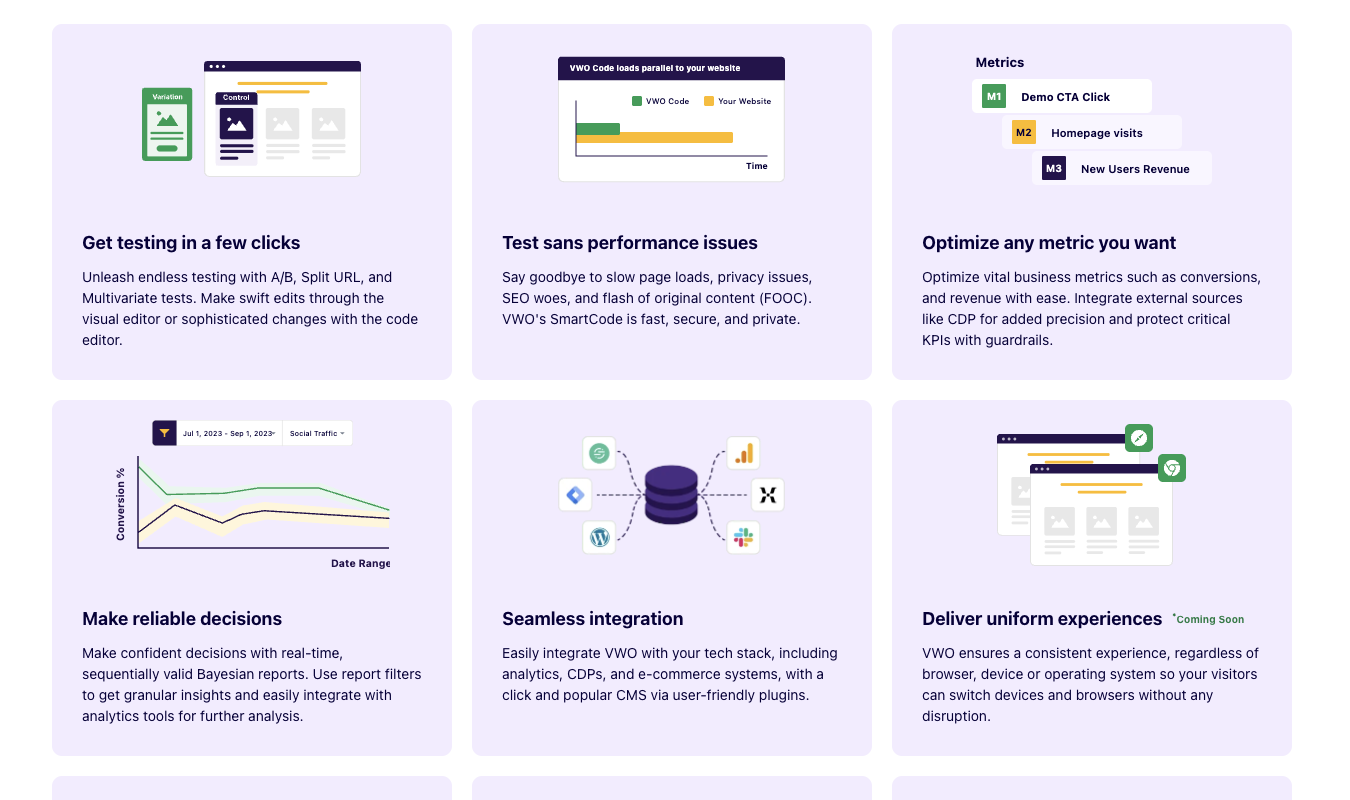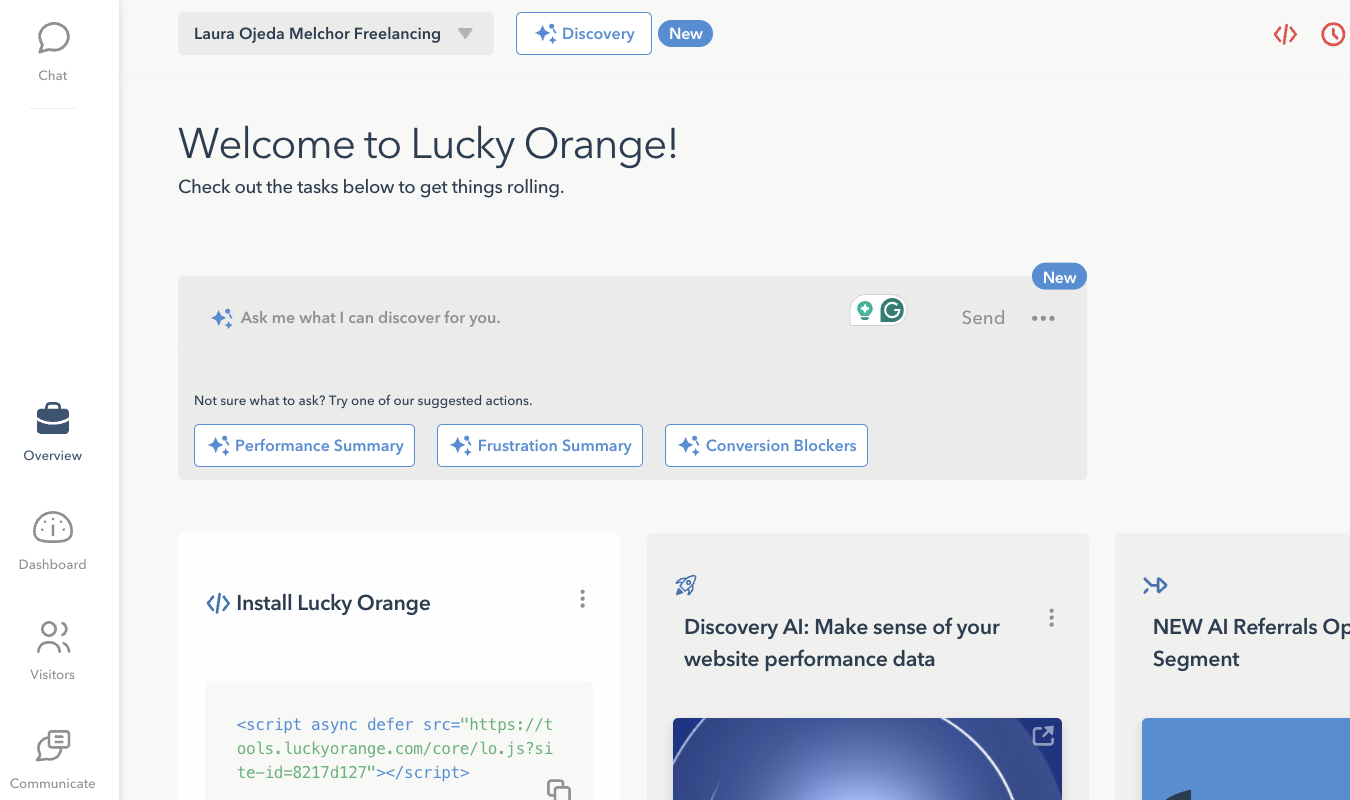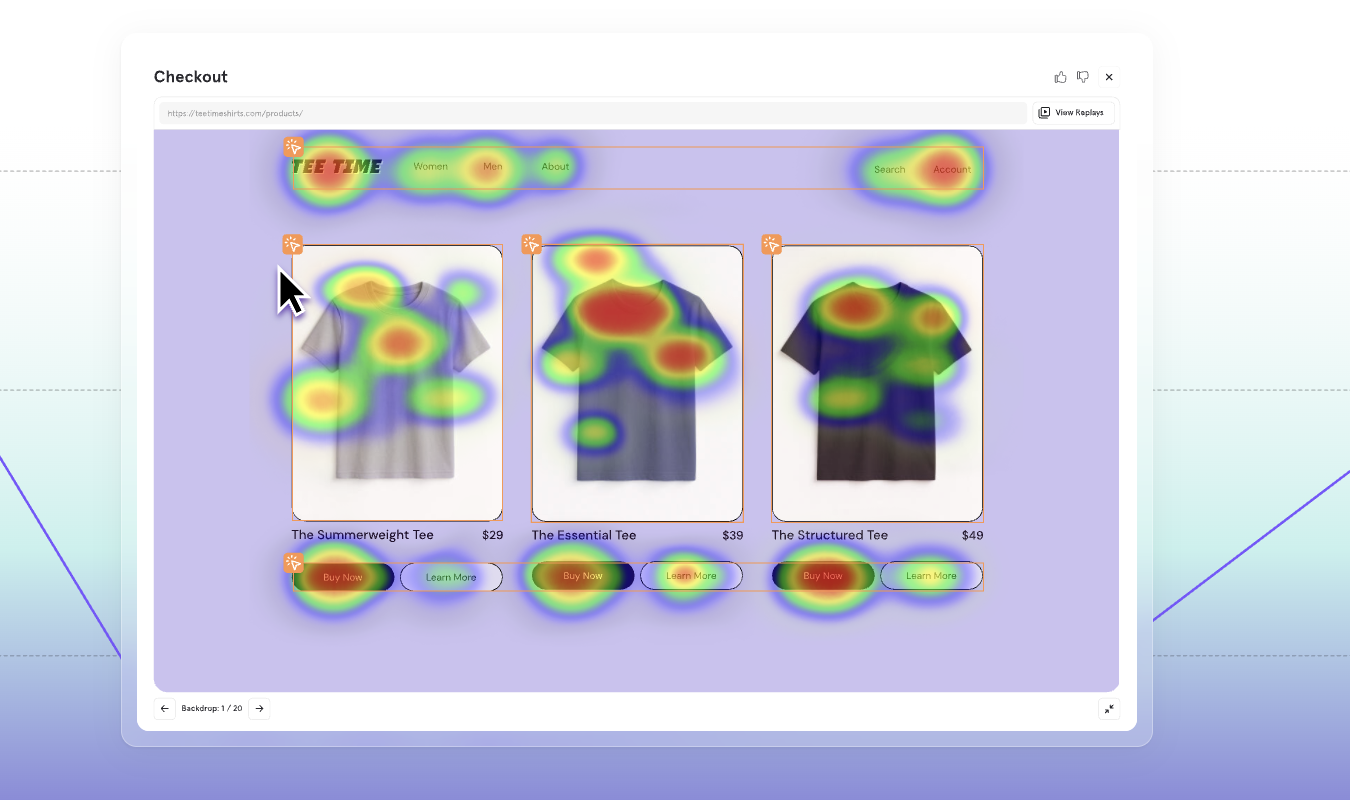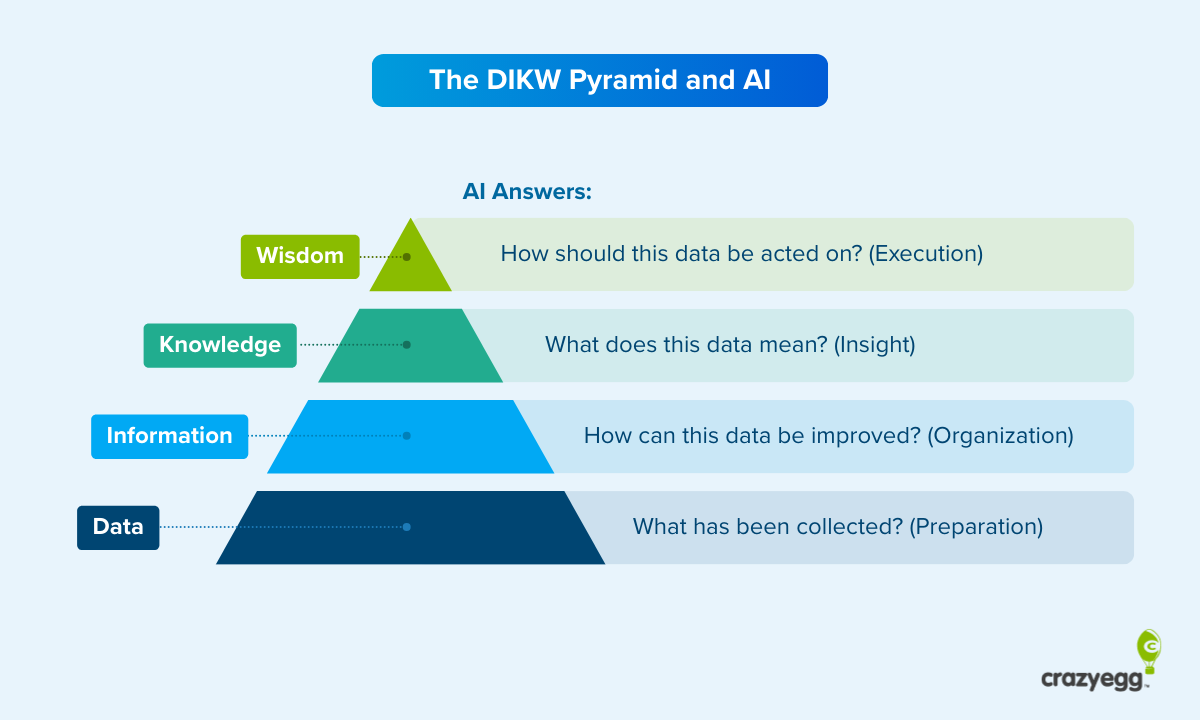Do you need to find an alternative to Amplitude, the product, market, and digital analytics software platform? We recommend Crazy Egg for website-based businesses, Mixpanel for orgs that want a full-funnel view, and PostHog for the coding fanatics among us.
My Personal Top 3 Alternatives to Amplitude
If you’re running low on time, check out this quick table of my favorite Amplitude alternatives.
Then, come back and read the rest of the piece for the why behind each choice when you’ve got some time.
| Best for web performance | Best for funnels & retention | Best for technical control |
 |  |  |
| Crazy Egg Pricing: Free plan with web analytics, paid plans start at $29/month What I like: Comprehensive heatmaps, detailed session recordings, built-in A/B testing, on-site surveys, error tracking, and strong privacy controls, all focused on making websites convert. | Mixpanel Pricing: Free plan, then paid from $20/month (event volume based) What I like: Works on both web and apps, tracks specific user actions, offers funnel and retention analysis; flexible filters, shareable dashboards, and automatic trend detection. | PostHog Pricing: Free self-hosted option; paid cloud plans start $0.000225/event What I like: Open-source and self-hosting friendly, includes analytics, replays, feature flags, surveys, and A/B testing in one place. Developer-focused and transparent road map. |
How I Chose These Amplitude Alternatives
When I searched for alternatives to Amplitude, here are the features I prioritized:
- Depth of product analytics features. I looked for platforms that help users dig into funnels, retention, and user journeys—even if they didn’t offer the same advanced level of these tools as Amplitude.
- Flexibility in tracking events. I considered how easy it is to define and track actions taken on a website or software platform without having to do a ton of complex setup.
- A/B testing and experimentation. Amplitude offers native experimentation and A/B testing tools, so any competitor worth its salt should, too.
- Data governance and accuracy. Analytics should be based on top-quality data, or else they’re useless. I prioritized tools with features like schema validation (making sure events include the right properties in the right format), identity resolution (to make sure users aren’t double-counted across devices), and deduplication (to make sure duplicate events don’t skew reports).
- User experience insights like heatmaps and session replays. I looked for tools that make it easy to visualize user behavior with heatmaps and replays. This helps go beyond just numbers and understand why users act the way they do.
- Integrations with data storage and management platforms. Amplitude and tools like it are designed to consistently pull in vast amounts of data. Because of this, it’s crucial that any alternative connects with data warehouses for central storage, customer data platforms (CDPs) to securely manage customer data, and engagement tools (like HubSpot) to make it easy for your team to act on the insights gathered.
Not every tool below meets every criteria point, but they hit the most important ones.
1. Crazy Egg
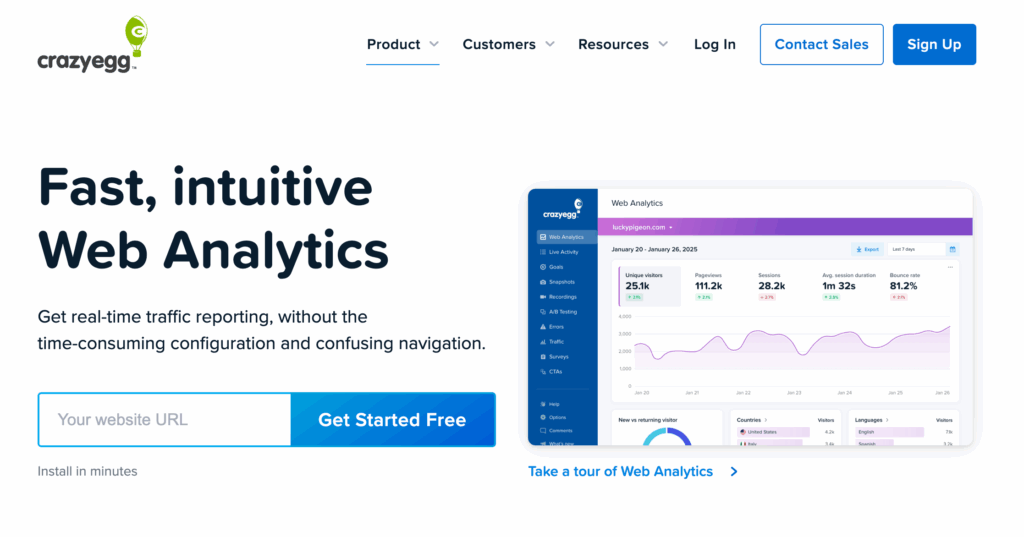
Crazy Egg is a behavior analytics platform offering analytics, heatmaps, session recordings, surveys, A/B testing, and conversion tracking—all with a dedicated focus on improving website performance.
What I like:
- Free web analytics. If you’re looking for a free Google Analytics alternative, Crazy Egg is perfect. The analytics portion of the product is free and also includes surveys.
- Comprehensive heatmaps. If you need a tool that goes above and beyond in the heatmapping department, Crazy Egg is for you. Users get five types of heatmaps, including click, scroll, confetti, overlay, and list maps. Further, you can segment these heatmaps in multiple ways, including by traffic source, user type, device, or UTM parameters.
- Detailed session recordings. Crazy Egg makes it easy to capture actual user sessions on your site. It only takes a few quick clicks to start tracking this data, and once you have a recording, analysis is a breeze. Tag key events, leave comments at specific moments, and tag teammates to stay cohesive as you dive into the session replays.
- Built-in A/B testing. Gone are the days of depending on A/B testing integrations when you want to run useful split tests. Like Amplitude, Crazy Egg includes A/B testing directly in the platform so you can validate changes quickly and without relying on a third-party service.
- On-site surveys. Amplitude offers a way to survey users, so naturally, I look for similar tools in any alternative. Crazy Egg’s survey tools allow you to add both pop-up and external surveys to ask users about their experience on your website. This rounds out the quantitative data you get from the heatmaps and user sessions.
- Error tracking. Crazy Egg can spot and highlights JavaScript errors and log device and browser details. It then ties these to the sessions they happen in to help your team diagnose issues more quickly.
- Strong privacy and security. Crazy Egg automatically masks all input fields, anonymizes IP addresses, excludes personally identifiable information (PII), and runs on Amazon Web Services with encryption and strict access controls.
What could use improving:
- No native mobile app analytics. Crazy Egg works perfectly for websites—including on mobile‚ but if you’re looking to gather analytics inside your iOS or Android app, you’ll have to look elsewhere. Crazy Egg doesn’t support in-app analytics.
How it stacks up to my Amplitude alternatives criteria:
- Crazy Egg covers heatmaps, session replay, A/B testing, surveys, and error tracking, but it’s web only. In other words, it hits almost every point on my criteria list, and if you have a web-based product, it’s the top choice
Best for:
- Marketers, conversion rate optimization (CRO) specialists, and web-based product dev teams that want an all-in-one behavior behavior analytics suite, complete with heatmaps, replays, surveys, and testing.
2. Mixpanel
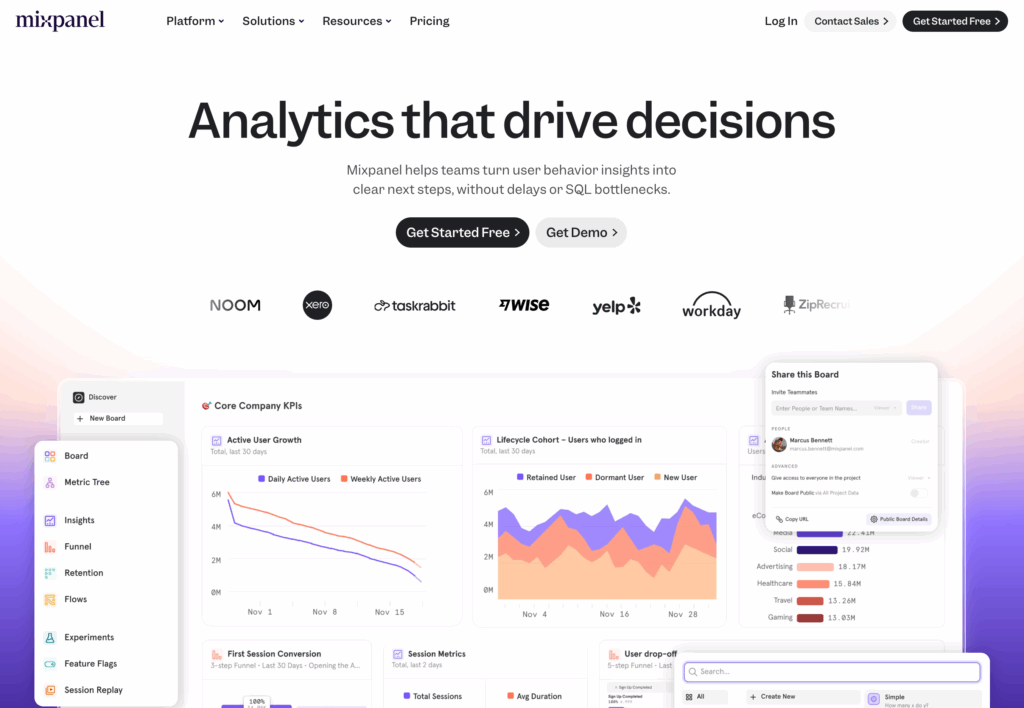
Mixpanel is a product analytics platform that specializes in tracking user behavior and retention, particularly via conversion funnels.
What I like:
- Works on both apps and websites. Mixpanel works for both websites and apps, so if you run a SaaS platform that’s both app and web-based, Mixpanel is a solid Amplitude alternative.
- Tracks actions, not just pageviews. While some tools rely on pageviews for in-depth analytics, Mixpanel logs specific user actions, like clicking buttons, using specific features, or going through product checkout.
- High visibility into funnels and retention reports. Mixpanel makes it easy to see where people drop off in a signup or checkout process to help you diagnose why people aren’t completing these forms. You can also easily see whether these users come back and finish the process or stay away for good, which helps track retention.
- Flexible filters. Analyzing results is easy with Mixpanel’s various filters. You can break down results by device type, user plan, country, or even a pre-defined property of your choice, like marketing campaign, signup source, or feature usage.
- Shareable dashboards. Collaboration is easy with Mixpanel, as teams can easily build charts and dashboards that update in real-time as information comes in. These can be shared across your entire organization so everyone can work on them together.
- Automatically detects trends. Mixpanel flags any sudden changes in your metrics, which makes it easy for you to spot issues or opportunities without doing a ton of digging.
What could use improving:
- No native A/B testing tools. You won’t find any built-in A/B testing tools in Mixpanel—instead, you’ll need to rely on integrations with tools like Optimizely or AB Tasty. This is doable, but it does require extra work on your end.
- No built-in surveys. Unlike Amplitude and many of its alternatives, including Crazy Egg, Mixpanel does not include a native survey tool. You’ll have to depend on integrations to source that qualitative data from web visitors and app users.
How it stacks up to my Amplitude alternatives criteria:
- Mixpanel is strong when it comes to event-based product analytics, funnels, retention, and segmentation with broad support for both apps and websites. But it lacks native heatmaps, replays, and surveys.
Best for:
- Product and growth teams at SaaS, mobile app, and consumer platform companies that need to dig into how users engage with their product over a period of time.
3. Posthog
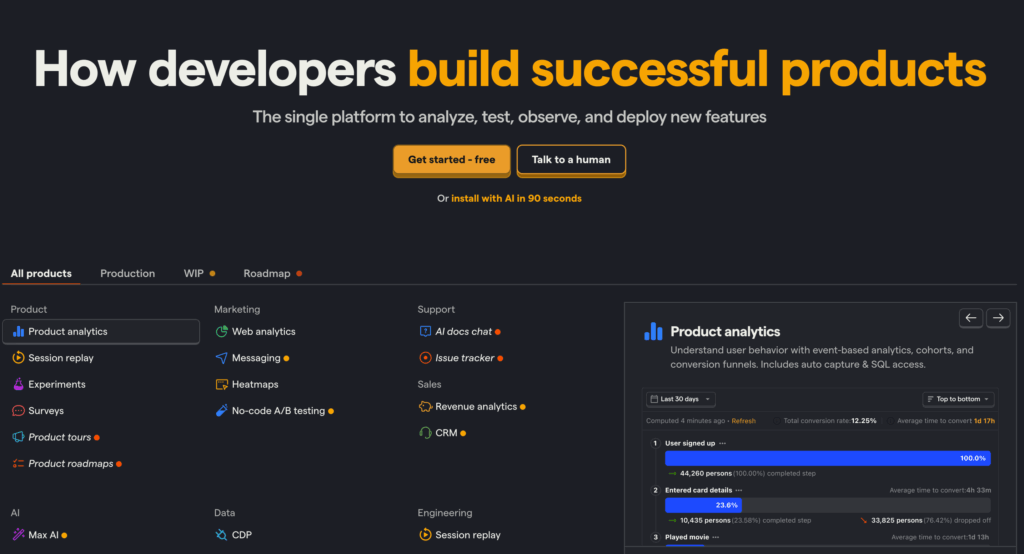
PostHog is a developer-focused product analytics platform that combines event tracking, session replays, feature flags, and A/B testing all in one place.
What I like:
- Open-source, self-hosting-friendly platform. Because it’s open-source and built to support self-hosting, you can deploy PostHog from your own infrastructure (AWS, GCP, or Azure, for example) if you need full control over the data. If you have strict data privacy or compliance requirements to follow, this is a big plus. But you don’t have to self-host if you don’t want to—PostHog offers a fully managed cloud service if you don’t want to manage the data yourself.
- Lots of tools in one. Along with product analytics for both websites and apps, PostHog offers session replays, feature flags, surveys, and A/B testing. Thanks to this tool combo, you don’t have to juggle a bunch of different platforms just to, say, roll out a new feature to 10% of your users, see how it affects engagement, and decide whether to roll it all the way out.
- Built with developers in mind. I don’t think there’s another tool on the market that focuses so wholeheartedly on making developers salivate. I mean, really. Pretty much everyone on the PostHog team has an engineering background and can expertly write code. And if you run into trouble while using PostHog, those expert team members can and will help you find a way through.
- Fast product updates. PostHog takes a unique angle on transparency and customer service, in that it actively listens to customers and takes feedback to heart. If its users want a feature, there’s a 99.99% chance PostHog is actively building that feature. You can even vote on what you want them to build and track updates in the changelog.
How it stacks up to my Amplitude alternatives criteria:
- PostHog offers product analytics for app and web, complete with session replays, feature flags, surveys, A/B testing, and self-hosting for tight control over data. It hits all the top spots and is an excellent choice—if you’re looking for a technical, infinitely customizable tool.
What could use improving:
- Takes more setup than plug-and-play tools. While PostHog’s flexibility is admirable, you will need a developer on your team in order to get the most out of it. It’s not exactly user-friendly for the non-technical among us, but it’s very upfront and clear about that. If you want to get started quickly and without needing to hire a dev team, go with Crazy Egg or Mixpanel.
Best for:
- Product teams with an abundance of technical know-how, startups, and companies that need top-notch privacy with data they fully control.
4. Pendo
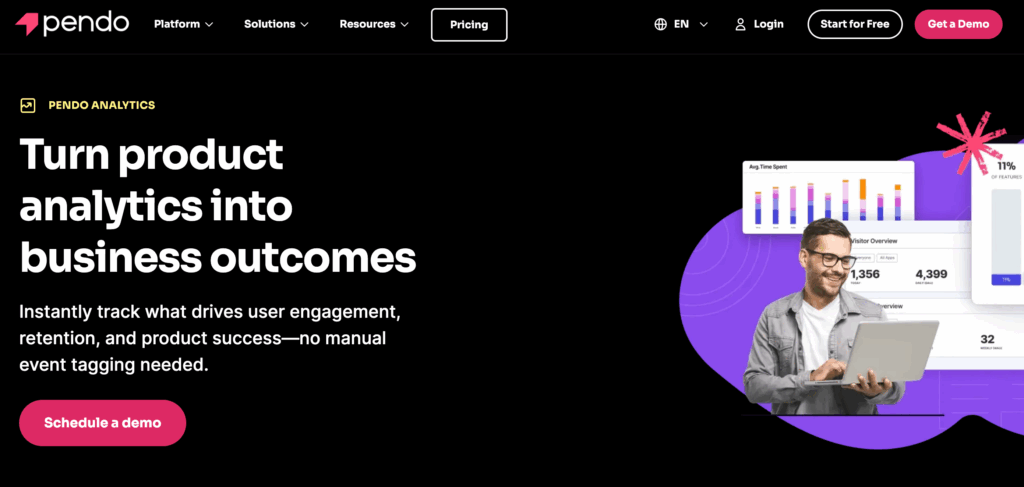
Pendo is a product adoption and analytics platform that helps teams understand user behavior inside websites and mobile apps.
What I like:
- In-app messaging and onboarding. Pendo works for both websites and apps, and it lets you create product tours, tips, and announcement directly inside your product. This means you can make it easier for new users to complete onboarding processes or explore new features.
- Deep product usage analytics. Pendo tracks every click, pageview, and use of a feature, which makes it easy for you to see which parts of your app get the most attention. And which don’t get much at all.
- Strong feedback collection feature. If you set up Pendo’s feedback tool, your users easily can submit requests for your product or website. On your team’s end, you can pair these requests with usage data to triage what needs attention—and then make fixes that improve the user experience. Even better, with advanced filtering and Pendo AI summaries, you don’t have to read every word of feedback to get the most out of it.
- Ideal for enterprise teams. With role-based dashboards, everyone in your organization can have a custom dashboard featuring only the metrics they care about the most. Pendo also supports single sign-on (SSO), role-based access, and SOC 2 compliance. It’s also very light on coding, so unlike with an Amplitude alternative like PostHog, you won’t need a dev team to use the product.
What could use improving:
- Enterprise pricing. While it is a solid solution for enterprise tools, Pendo’s pricing details are gated, which is annoying. You can explore the different plans, but that’s it. You can’t see prices unless you talk to a sales rep. Anytime pricing is hidden like this, I assume a high price tag.
- Too heavy for some teams. If your product is web-based, you don’t need a tool as weighted down in features as Pendo. A solution like Crazy Egg is ideal (and a lot more affordable) if your product is browser-only.
How it stacks up to my Amplitude alternatives criteria:
- Pendo combines product usage analytics with in-app guides, surveys, session replays, and heatmaps, but its A/B testing is limited those in-app guides. And the advanced integrations and data governance features are mostly found on higher plan tiers.
Best for:
- Product and customer success teams at mid-to-large companies that want strong customer feedback and usage analytics for app-based SaaS products.
What’s the Best Amplitude Alternative?
If you’re looking for a way to track user behavior on your website, Crazy Egg is the best choice. It’s affordable, offers deep analytics, and provides a way for you to gather both qualitative and quantitative feedback from users.
For in-app analytics and web-based events tracking, Mixpanel is a strong choice. And if you want granular, developer-friendly control over every aspect of your analytics experience, look no further than PostHog.



